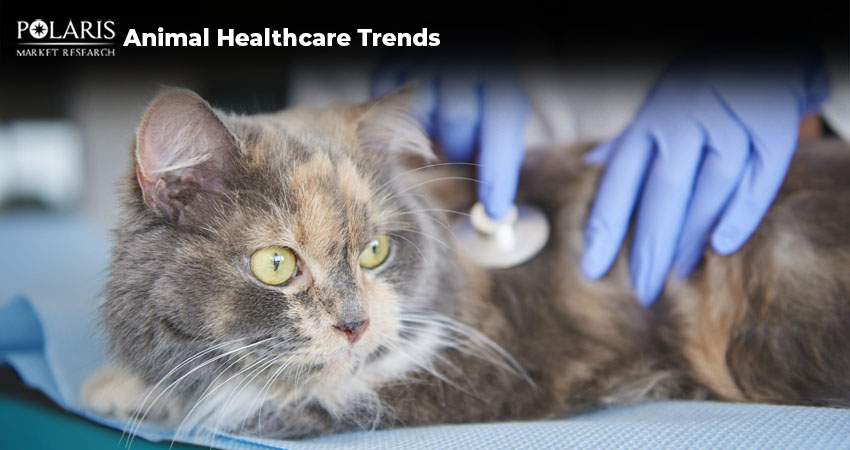Animal Healthcare Trends: Innovations Reshaping Market Landscape Revealed

Animal health has always been of paramount interest as humans increasingly rely on animals for work or in the form of companionship. Animals, when used on the basis of providing humans with animal products such as eggs and milk, are of great nutritional benefit to human health. In order to keep up with market demands for the provision of milk, eggs, and meat, innovation in the animal health market has taken major precedence.
Looking to understand how animal health impacts our lives? In this blog, we’ll explore the key trends driving the evolution of animal healthcare, shedding light on the latest advancements and developments in this rapidly growing sector.
Animal Health: Brief Overview
When humans rely on animals for financial benefits, as in the case of farming, it is essential to maintain the animals' mental and physical health. This helps in creating a harmonious environment for the animal to thrive in. The animal health market revolves around the upkeep of all animals and their interaction with the environment, as well as their fellow human beings. Animal health helps in keeping a tab on the current state of health of an animal and how it is coping with its immediate surroundings. It encompasses various aspects, such as the mental as well as physical well-being of the organism.
Did you know that the increasing need for animal protein and the rising prevalence of pet ownership are driving the animal health market demand? According to Polaris Market Research’s latest analysis, the market is poised to reach USD 149.02 billion by 2032, exhibiting a CAGR of 10.5% from 2024 to 2032.
Emerging Animal Health Market Trends
The following are some of the major trends transforming the animal health landscape:
Introduction of Telemedicine
Telemedicine is a rapidly emerging advancement in the healthcare sector. It has found a valuable integration with the animal health market in order to help veterinary care become accessible as well as efficient. It has become increasingly important for pets as well as livestock in the form of wearable devices that help veterinarians understand the animal’s vitals and check the differences in behavior patterns. This mitigates the need for frequent visits to animal health care professionals, and remote monitoring of animals is possible with the advent of telemedicine.
Latest Telemedicine Development: VetTriage has made its innovation accessible to exotic animal species for remote monitoring and regulation of the animal’s health. Using functions such as video conferencing and digital diagnostic tools, assessment of the animal’s health becomes easier, reducing the cost of transportation along with the wastage of time.
Rise of Personalized Medicine
Personalized medication has significantly helped in targeting certain diseases, such as cardiac myopathy, in animals. Studies have shown how prior knowledge about genetic variations in animals helps medically tweak the drug prescription for an individual organism, thereby resulting in a more precise approach for targeting disease and curing the veterinary patient of it.
Personalized medicine has proven to be highly beneficial in veterinary oncology, which is concerned with the study and treatment of cancer in animals. Just like humans, pets can suffer from various forms of cancer. But the way they respond to the treatment can vary. By understanding the genetic makeup of animals, veterinarians can determine which chemotherapy drugs or treatment regimens are most likely to be effective. This targeted approach results in higher success rates in treating cancer and improves the overall prognosis of the animal.
Adoption of Wearable Devices
Just as humans have taken to wearable devices in order to track their health, the same has occurred for animals. By using blockchain technology and IoT, data regarding the animal’s health can be improved or tracked rigorously. Monitoring all the health systems, such as heartbeat monitoring and an accurate body analysis, can result in understanding the inner workings of the animal.
Latest Wearable Device Development: PETMEDICS recently released its heart monitoring device, which can efficiently track heartbeat as well as store vital information concerning the animal’s fitness level along with the fluctuations in temperature level that occur when placed in different surroundings. The system can be adapted for various types of animals while storing the historical health data of the animal in the wearable device itself.
Shift Towards Nutraceuticals and Functional Foods for Pets
In recent years, the pet industry has witnessed a major shift towards the adoption of products that go beyond basic nutrition. Nutraceuticals and functional foods have emerged as powerful ways to improve the overall health and well-being of animals. These products offer targeted benefits such as enhanced digestion, stronger immunity, joint health, and cognitive support. They often include ingredients such as omega-3 fatty acids, probiotics, antioxidants, glucosamine, and herbal extracts, each of which is tailored to address specific health concerns and support overall vitality.
The need for high-quality, health-boosting ingredients is further fueled by the pet humanization trend. Pet owners globally are increasingly investing in preventive care than ever before. Nutraceuticals and functional foods help fill nutritional gaps and provide non-pharmaceutical options to maintain health, reduce the risk of illness, and improve quality of life.
Wrapping Up
Animal healthcare has come up with a host of advancements in recent years due to improvements in the research capabilities of the animal healthcare sector. This advancement has caught the attention of many pets as well as livestock owners who are looking to improve the health conditions of their livestock or track any immediate changes in their physical health or behavioral patterns. From telemedicine to wearable health trackers and nutraceuticals, a wide range of innovations are making it easier to detect, prevent, and manage animal health issues proactively. As technology continues to evolve, the future of animal healthcare looks increasingly personalized, accessible, and data-driven.

